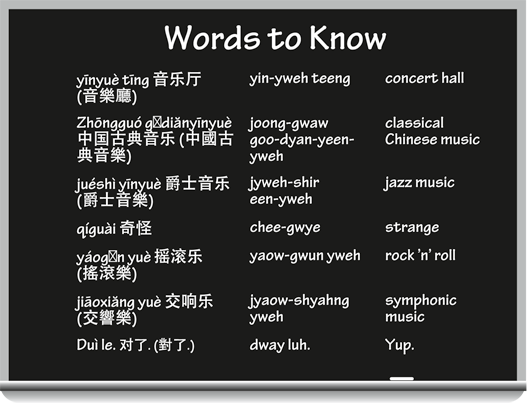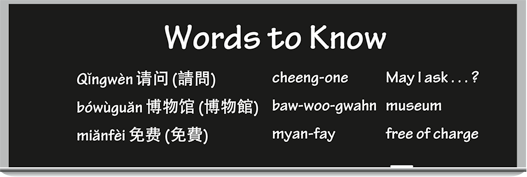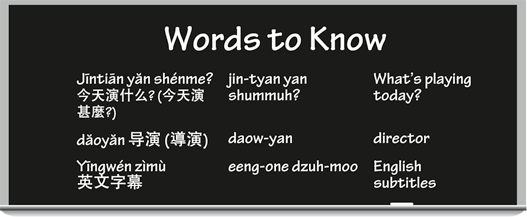Chapter 10
Exploring the Town
In This Chapter
 Dropping in on a show
Dropping in on a show
 Checking out museums and historical sites
Checking out museums and historical sites
 Taking in a movie or concert
Taking in a movie or concert
 Hanging out in bars and clubs
Hanging out in bars and clubs
Don’t even think of staying around your hotel or house on a beautiful sunny day — especially if you’re about to explore a new chéngshì 城市 (chuhng-shir) (city) in China. You have so much to see and do. You may want to check out a performance of Peking Opera or head over to the nearest museum to take in an art exhibit. Or perhaps a movie or concert and a nightcap are more your style. However you want to spend your time in town, this chapter gives you the vocab you need.
Attending a Performance
Plan on taking in a few yǎnchū 演出 (yan-choo) (shows) in the near future? You have so much to choose from nowadays. You can check out some gējù 歌剧 (歌劇) (guh-jyew) (operas), or, if you prefer, a bāléiwú 芭蕾舞 (bah-lay-woo) (ballet) or a yīnyuèhuì (yin-yweh-hway) (music concert).
The following sections help you talk about all sorts of performances, from naming your favorite kind of music to getting your tickets and chatting about others’ experiences.
Exploring different types of music
You often hear that the language of music crosses international boundaries. If you’re feeling a bit exhausted after practicing Chinese, you can head to a musical event in the evening where you can relax. Let the music transport you to another mental space.
Here are some terms to help you talk about music and performances:
 dàiwèiyuán 带位员 (帶位員) (dye-way-ywan) (usher)
dàiwèiyuán 带位员 (帶位員) (dye-way-ywan) (usher)
 gē chàng huì 歌唱会 (歌唱會) (guh chahng hway) (choral recital)
gē chàng huì 歌唱会 (歌唱會) (guh chahng hway) (choral recital)
 gǔdiǎn yīnyuè 古典音乐 (古典音樂) (goo-dyan een-yweh) (classical music)
gǔdiǎn yīnyuè 古典音乐 (古典音樂) (goo-dyan een-yweh) (classical music)
 jiāoxiǎng yuè 交响乐 (交響樂) (jyaow-shyahng yweh) (symphonic music)
jiāoxiǎng yuè 交响乐 (交響樂) (jyaow-shyahng yweh) (symphonic music)
 jiémùdān 节目单 (節目單) (jyeh-moo-dahn) (program)
jiémùdān 节目单 (節目單) (jyeh-moo-dahn) (program)
 jùchǎng 剧场 (劇場) (jyew-chahng) (theatre)
jùchǎng 剧场 (劇場) (jyew-chahng) (theatre)
 juéshì yīnyuè 爵士音乐 (爵士音樂) (jyweh-shir een-yweh) (jazz music)
juéshì yīnyuè 爵士音乐 (爵士音樂) (jyweh-shir een-yweh) (jazz music)
 lǐtáng 礼堂 (禮堂) (lee-tahng) (auditorium)
lǐtáng 礼堂 (禮堂) (lee-tahng) (auditorium)
 míngē 民歌 (meen-guh) (folk song)
míngē 民歌 (meen-guh) (folk song)
 mùjiān xiūxi 幕间休息 (幕間休息) (moo-jyan shyo-she) (intermission)
mùjiān xiūxi 幕间休息 (幕間休息) (moo-jyan shyo-she) (intermission)
 qì yuè 器乐 (器樂) (chee yweh) (instrumental music)
qì yuè 器乐 (器樂) (chee yweh) (instrumental music)
 shìnèi yuè 室内乐 (室內樂) (shir-nay yweh) (chamber music)
shìnèi yuè 室内乐 (室內樂) (shir-nay yweh) (chamber music)
 yáogǔn yuè 摇滚乐 (搖滾樂) (yaow-gun yweh) (rock ’n’ roll)
yáogǔn yuè 摇滚乐 (搖滾樂) (yaow-gun yweh) (rock ’n’ roll)
 Zhōngguó gǔdiǎn yīnyuè 中国古典音乐 (中國古典音樂) (joong-gwaw goo-dyan yeen-yweh) (classical Chinese music)
Zhōngguó gǔdiǎn yīnyuè 中国古典音乐 (中國古典音樂) (joong-gwaw goo-dyan yeen-yweh) (classical Chinese music)
Talkin’ the Talk
Lydia and Nelson discuss what kind of concert to attend this weekend.
Nelson:
Wǒmen zhèige zhōumò qù yīnyuè tīng tīng Zhōngguó gǔdiǎn yīnyuè ba.
waw-men jay-guh joe-maw chyew een-yweh teeng teeng joong-gwaw goo-dyan een-yweh bah.
Let’s go to the concert hall to hear a classical Chinese music concert this weekend.
Lydia:
Wǒ bùxǐhuān Zhōngguó gǔdiǎn yīnyuè. Wǒ gèng xǐhuān juéshì yīnyuè.
waw boo-she-hwahn joong-gwaw goo-dyan yeen-yweh. waw gung she-hwahn jyweh-shir een-yweh.
I don’t like classical Chinese music. I prefer jazz.
Nelson:
Juéshì yīnyuè tài qíguài. Yáogǔn yuè yě bùxǐhuān.
jyweh-shir een-yweh tye chee-gwye. yaow-gwun yweh yeh boo-she-hwahn.
Jazz is too strange. I also don’t like rock ’n’ roll.
Lydia:
Nǐ dàgài zhǐ xǐhuān jiāoxiǎng yuè nèi lèi de yīnyuè ba.
nee dah-gye jir she-hwahn jyaow-shyahng yweh nay lay duh een-yweh bah.
You probably only like symphonic music and that sort of thing.
Nelson:
Duì le.
dway luh.
Yup.

Buying a ticket
Before you can attend any performances, however, you have to buy a piào 票 (pyaow) (ticket) or two. The following phrases should help you get what you want, or at least understand what you’re being told:
 Duìbùqǐ, jīntiān wǎnshàng de piào dōu màiwán le. 对不起, 今天晚上的票都卖完了. (對不起, 今天晚上的票都賣完了.) (dway-boo-chee, jin-tyan wahn-shahng duh pyaow doe my-wahn luh.) (I’m sorry, tickets for tonight are all sold out.)
Duìbùqǐ, jīntiān wǎnshàng de piào dōu màiwán le. 对不起, 今天晚上的票都卖完了. (對不起, 今天晚上的票都賣完了.) (dway-boo-chee, jin-tyan wahn-shahng duh pyaow doe my-wahn luh.) (I’m sorry, tickets for tonight are all sold out.)
 Shénme shíhòu kāiyǎn? 什么时侯开演? (甚麼時候開演?) (shummuh shir-ho kye-yan?) (What time does the show begin?)
Shénme shíhòu kāiyǎn? 什么时侯开演? (甚麼時候開演?) (shummuh shir-ho kye-yan?) (What time does the show begin?)
 Shénme shíhòu yǎn wán? 什么时侯演完? (甚麼時候演完?) (shummuh shir-ho yan wahn?) (What time does the show end?)
Shénme shíhòu yǎn wán? 什么时侯演完? (甚麼時候演完?) (shummuh shir-ho yan wahn?) (What time does the show end?)
 Wǒ yào mǎi yì zhāng dàrén piào, liǎng zhāng értóng piào. 我要买一张大人票, 两张儿童票. (我要買一張大人票, 兩張兒童票.) (waw yaow my ee jahng dah-run pyaow, lyahng jahng are-toong pyaow) (I’d like to buy one adult ticket and two kid’s tickets.)
Wǒ yào mǎi yì zhāng dàrén piào, liǎng zhāng értóng piào. 我要买一张大人票, 两张儿童票. (我要買一張大人票, 兩張兒童票.) (waw yaow my ee jahng dah-run pyaow, lyahng jahng are-toong pyaow) (I’d like to buy one adult ticket and two kid’s tickets.)
 Yǒu méiyǒu jīntiān wǎnshàng yǎnchū de piào? 有没有今天晚上演出的票? (yo mayo jin-tyan wahn-shahng yan-choo duh pyaow?) (Are there any tickets to tonight’s performance?)
Yǒu méiyǒu jīntiān wǎnshàng yǎnchū de piào? 有没有今天晚上演出的票? (yo mayo jin-tyan wahn-shahng yan-choo duh pyaow?) (Are there any tickets to tonight’s performance?)
 Zài nǎr kéyǐ mǎidào piào? 在哪儿可以买到票? (在哪兒可以買到票?) (dzye nar kuh-yee my-daow pyaow?) (Where can I buy tickets?)
Zài nǎr kéyǐ mǎidào piào? 在哪儿可以买到票? (在哪兒可以買到票?) (dzye nar kuh-yee my-daow pyaow?) (Where can I buy tickets?)
Asking whether someone has done something
Nǐ kànguò Jīngjù ma? 你看过京剧吗? (你看過京劇嗎?) (nee kahn-gwaw jeeng-jyew mah?) (Have you ever seen Peking Opera?)
Nǐ chīguò xiā méiyǒu? 你吃过虾没有? (你吃過蝦沒有?) (nee chir-gwaw shyah mayo?) (Have you ever eaten shrimp?)
Nǐ qùguò Měiguó ma? 你去过美国吗? (你去過美國嗎?) (nee chyew-gwaw may-gwaw mah?) (Have you ever been to America?)
To answer any of these questions, you can repeat the verb plus guò if the answer is yes, or simply say méiyǒu, meaning No, I haven’t. You can also say méiyǒu [verb] guò if you want.
If you happen to do something chángcháng 常常 (chahng-chahng) (often) or just yǒude shíhòu 有的时侯 (yo-duh shir-ho) (sometimes), don’t be shy about saying so. You can use these adverbs in both the questions and the answers.
Exploring Museums and Galleries
Theatre shows and live musical performances aren’t the only forms of entertainment you can see to get your fill of wénhuà 文化 (one-hwah) (culture). One of the nicest, calmest activities to do at your own pace is to visit a bówùguǎn 博物馆 (博物館) (baw-woo-gwahn) (museum) or huàláng 画廊 (畫廊) (hwah-lahng) (gallery).
You can check out anything from gǔdàide yìshù pǐn 古代的艺术品 (古代的藝術品) (goo-dye-duh ee-shoo peen) (ancient artifacts) to shānshuǐ huà 山水画 (山水畫) (shahn-shway hwah) (landscape painting) to xiàndài yìshù 现代艺术 (現代藝術) (shyan-dye ee-shoo) (modern art). Sometimes the best reason to go to a bówùguǎn is to buy some lǐwù 礼物 (禮物) (lee-woo) (gifts) and some cool zhāotiē 招贴 (招貼) (jaow-tyeh) (posters) for yourself.
Here are some questions you may want to ask in a museum or gallery:
 Bówùguǎn jǐdiǎn zhōng kāimén? 博物馆几点钟开门? (博物館幾點鐘開門?) (baw-woo-gwahn jee-dyan joong kye-mun?) (What time does the museum open?)
Bówùguǎn jǐdiǎn zhōng kāimén? 博物馆几点钟开门? (博物館幾點鐘開門?) (baw-woo-gwahn jee-dyan joong kye-mun?) (What time does the museum open?)
 Lǐpǐn shāngdiàn shénme shíhòu guānmén? 礼品商店什么时侯关门? (禮品商店甚麼時候關門?) (lee-peeng shahng-dyan shummuh shir-ho gwahn-mun?) (What time does the gift shop close?)
Lǐpǐn shāngdiàn shénme shíhòu guānmén? 礼品商店什么时侯关门? (禮品商店甚麼時候關門?) (lee-peeng shahng-dyan shummuh shir-ho gwahn-mun?) (What time does the gift shop close?)
 Nǐmen mài búmài zhāotiē? 你们卖不卖招贴? (你們賣不賣招貼?) (nee-mun my boo-my jaow-tyeh?) (Do you sell posters?)
Nǐmen mài búmài zhāotiē? 你们卖不卖招贴? (你們賣不賣招貼?) (nee-mun my boo-my jaow-tyeh?) (Do you sell posters?)
Talkin’ the Talk
George:
Qǐngwèn, nǐmen jǐdiǎn zhōng guānmén?
cheeng-one, nee-mun jee-dyan joong gwahn-mun?
Excuse me, what time do you close?
Clerk:
Zhèige bówùguǎn wǎnshàng liù diǎn zhōng guānmén.
jay-guh baw-woo-gwahn wahn-shahng lyo dyan joong gwahn-mun.
This museum closes at 6:00 p.m.
George:
Xiànzài yǐjīng wǔdiǎn duō le. Wǒ néng bùnéng miǎnfèi jìnqù?
shyan-dzye ee-jeeng woo-dyan dwaw luh. waw nung boo-nung myan-fay jeen-chyew?
It’s now already after 5:00. May I enter for free?
Clerk:
Bùxíng. Hái yào fùqián. Shí kuài yì zhāng.
boo-sheeng. hi yaow foo-chyan. shir kwye ee jahng.
No. You still have to pay. It’s $10 a ticket.
George:
Nà, wǒ míngtiān zài lái, duō huā yìdiǎr shíjiān zài zhèr. Xièxiè.
nah, waw meeng-tyan dzye lye, dwaw hwah ee-dyar shir-jyan dzye jar. shyeh-shyeh.
In that case, I’ll come back tomorrow to spend a little more time here. Thanks.

Visiting Historical Sites
Make sure to take at least one well-coordinated trip to a historical site if you visit China, even if you have only a week for business. Take the Cháng Chéng 长城 (長城) (chahng chung) (Great Wall), for example. Just north of Beijing, the wall is one of the greatest man-made objects on earth.
And while you’re on your way to the Great Wall, you may want to stop off at the Míng shísān líng 明十三陵 (meeng shir-sahn leeng) (Ming Tombs), which contain the mausoleums of 13 Ming dynasty (1368–1644) emperors guarded by stone animals and warrior statues.
By far the easiest way to see the major historical sites in China is to join a tour. Here are some phrases that may come in handy:
 Bàn tiān duōshǎo qián? 半天多少钱? (半天多少錢?) (bahn tyan dwaw-shaow chyan?) (How much for half a day?)
Bàn tiān duōshǎo qián? 半天多少钱? (半天多少錢?) (bahn tyan dwaw-shaow chyan?) (How much for half a day?)
 Lǚxíngshè zài nǎr? 旅行社在哪儿? (旅行社在哪兒?) (lyew-sheeng-shuh dzye nar?) (Where’s the travel agency?)
Lǚxíngshè zài nǎr? 旅行社在哪儿? (旅行社在哪兒?) (lyew-sheeng-shuh dzye nar?) (Where’s the travel agency?)
 Nǐ yǒu méiyǒu lǚyóu shǒucè? 你有没有旅游手册? (你有沒有旅遊手冊?) (nee yo mayo lyew-yo show-tsuh?) (Do you have a guidebook?)
Nǐ yǒu méiyǒu lǚyóu shǒucè? 你有没有旅游手册? (你有沒有旅遊手冊?) (nee yo mayo lyew-yo show-tsuh?) (Do you have a guidebook?)
 Yǒu méiyǒu shuō Yīngwén de dǎoyóu? 有没有说英文的导游? (有沒有說英文的導遊?) (yo mayo shwaw eeng-one duh daow-yo?) (Are there any English-speaking guides?)
Yǒu méiyǒu shuō Yīngwén de dǎoyóu? 有没有说英文的导游? (有沒有說英文的導遊?) (yo mayo shwaw eeng-one duh daow-yo?) (Are there any English-speaking guides?)
Talkin’ the Talk
Sammy hires a taxi and takes his two children to the Jade Buddha Temple in Shanghai, where he tries to get entrance tickets from the clerk. He’s eager to show his children the temple’s Song dynasty (960–1279) architecture.
Sammy:
Qǐngwèn, zài nǎr kéyǐ mǎi piào?
cheeng-one, dzye nar kuh-yee my pyaow?
Excuse me, where can I buy tickets for admission?
Clerk:
Jiù zài zhèr.
jyo dzye jar.
You can buy them here.
Sammy:
Hǎojíle. Piàojià duōshǎo?
how-jee-luh. pyaow-jyah dwaw-shaow?
Great. How much is the ticket price?
Clerk:
Yìzhāng shí kuài.
ee-jahng shir kwye.
Tickets are $10 each.
Sammy:
Xiǎo háizi miǎnfèi ma?
shyaow hi-dzuh myan-fay mah?
Do children get in free?
Clerk:
Bù miǎnfèi, kěshì xiǎo háizi bànpiào.
boo myan-fay, kuh-shir shyaow hi-dzuh bahn-pyaow.
No, but they’re half price.
Sammy:
Wǒmen kě bù kěyǐ zhàoxiàng?
waw-mun kuh boo kuh-yee jaow-shyahng?
May we take pictures?
Clerk:
Dāngrán kěyǐ. Méiyǒu wèntí.
dahng-rahn kuh-yee. mayo one-tee.
Of course you can. No problem.

Going to the Movies
After a full day of sightseeing, you may want to relax, kick back, and take in a diànyǐng 电影 (電影) (dyan-yeeng) (movie). At the movies you can sit and watch what’s on the yínmù 银幕 (銀幕) (yeen-moo) (screen) without walking or talking. But what to do when the lights dim and you suddenly realize the film is completely in Zhōngwén 中文 (joong-one) (Chinese), without any Yīngwén zìmù 英文字母 (eeng-one dzuh-moo) (English subtitles) whatsoever? You read this book, of course!
What kind of movie do you want to see? Table 10-1 gives you a few genres to choose from:
Table 10-1 Movie Genres
|
Chinese |
Pronunciation |
English |
|
àiqíng piān 爱情片 (愛情片) |
eye-cheeng pyan |
romance |
|
dònghuà piān 动画片 (動畫片) |
doong-hwah pyan |
cartoon |
|
dòngzuò piān 动作片 (動作片) |
doong-dzwaw pyan |
action |
|
gùshi piān 故事片 |
goo-shir pyan |
drama |
|
jìlù piān 纪录片 (紀錄片) |
jee-loo pyan |
documentary |
|
kǒngbù piān 恐怖片 |
koong-boo pyan |
horror |
|
wàiguópiān 外国片 (外國片) |
wye-gwaw-pyan |
foreign film |
|
wǔxiá piān 武侠片 (武俠片) |
woo-shyah pyan |
kung-fu |
|
xǐjù piān 喜剧片 (喜劇片) |
she-jyew pyan |
comedy |
Talkin’ the Talk
Wendy and Elly decide to go to the movies tonight.
Wendy:
Wǒmen jīntiān wǎnshàng qù kàn yíbù diànyǐng ba.
waw-men jin-tyan wahn-shahng chyew kahn ee-boo dyan-yeeng bah.
Let’s go see a movie tonight.
Elly:
Jīntiān yǎn shénme?
jin-tyan yan shummuh?
What’s playing today?
Wendy:
Yíge Zhāng Yìmóu dǎoyǎn de piānzi. Wǒ wàngle nèige míngzi.
ee-guh jahng ee-moe daow-yan duh pyan-dzuh. waw wahng-luh nay-guh meeng-dzuh.
A film directed by Zhang Yimou. I forget the name.
Elly:. Shì shuō Yīngwén de ma?
shir shwaw eeng-one duh mah?
Is it in English?
Wendy:
Búshì, kěshì yǒu Yīngwén zìmù.
boo-shir, kuh-shir yo eeng-one dzuh-moo.
No, but there are English subtitles.

Hopping Around Bars and Clubs
Are you a night owl who, after a full day of sightseeing and even an evening concert, still has the energy to go barhopping and carousing around fun clubs? If so, you need to know some common barspeak, especially when you’re on vacation in a toddlin’ town like Shanghai — or Chicago, for that matter. After all, not everyone you meet or go out with may be fluent in English. The following phrases may come in handy when you’re out exploring the local pubs and dance halls:
 Nǐ xiǎng gēn wǒ tiàowǔ ma? 你想跟我跳舞吗? (你想根我跳舞嗎?) (nee shyahng gun waw tyaow-woo mah?) (Would you like to dance?)
Nǐ xiǎng gēn wǒ tiàowǔ ma? 你想跟我跳舞吗? (你想根我跳舞嗎?) (nee shyahng gun waw tyaow-woo mah?) (Would you like to dance?)
 Qǐng lái yìpíng píjiǔ. 请来一瓶啤酒. (請來一瓶啤酒.) (cheeng lye ee-peeng pee-jyoe.) (Please bring me a bottle of beer.)
Qǐng lái yìpíng píjiǔ. 请来一瓶啤酒. (請來一瓶啤酒.) (cheeng lye ee-peeng pee-jyoe.) (Please bring me a bottle of beer.)
 Wǒmen dào nǎr qù tiàowǔ? 我们到哪儿去跳舞? (我們到哪兒去跳舞?) (waw-men daow nar chyew tyaow-woo?) (Where can we go to dance?)
Wǒmen dào nǎr qù tiàowǔ? 我们到哪儿去跳舞? (我們到哪兒去跳舞?) (waw-men daow nar chyew tyaow-woo?) (Where can we go to dance?)
 Wǒ néng bùnéng qǐng nǐ hē jiǔ? 我能不能请你喝酒? (我能不能請你喝酒?) (waw nung boo-nung cheeng nee huh jyoe?) (May I get you a drink?)
Wǒ néng bùnéng qǐng nǐ hē jiǔ? 我能不能请你喝酒? (我能不能請你喝酒?) (waw nung boo-nung cheeng nee huh jyoe?) (May I get you a drink?)
 Yǒu méiyǒu rùchǎng fèi? 有没有入场费? (有没有入場費?) (yo mayo roo-chahng fay?) (Is there a cover charge?)
Yǒu méiyǒu rùchǎng fèi? 有没有入场费? (有没有入場費?) (yo mayo roo-chahng fay?) (Is there a cover charge?)
When you go to a bar with friends, you may ask for some bīngzhèn de píjiǔ 冰镇的啤酒 (冰鎮的啤酒) (beeng-juhn duh pee-jyoe) (cold beer) or maybe some hóng 红 (紅) (hoong) (red) or bái 白 (bye) (white) pútáo jiǔ 葡萄酒 (poo-taow jyoe) (wine). And don’t forget to ask for some huāshēngmǐ 花生米 (hwah-shung-mee) (peanuts) or tǔdòupiàn 土豆片 (too-doe-pyan) (potato chips) so you don’t get too sloshed with all that píjiǔ.
 Fun & Games
Fun & Games
Match the English term on the left with the corresponding Chinese term on the right. You can find the answers in Appendix D.
|
1. movie theatre |
a. yīnyuè huì 音乐会 (音樂會) |
|
2. concert hall |
b. Jīngjù 京剧 (京劇) |
|
3. museum |
c. yìshù 艺术 (藝術) |
|
4. art |
d. bówùguǎn 博物馆 (博物館) |
|
5. concert |
e. yīnyuè tīng 音乐厅 (音樂廳) |
|
6. Peking opera |
f. diànyǐng yuàn 电影院 (電影院) |

 If you’re thinking of going out on the town with a new date, and you want to ask them whether they have ever done something so you can plan something special, just add the particle
If you’re thinking of going out on the town with a new date, and you want to ask them whether they have ever done something so you can plan something special, just add the particle 